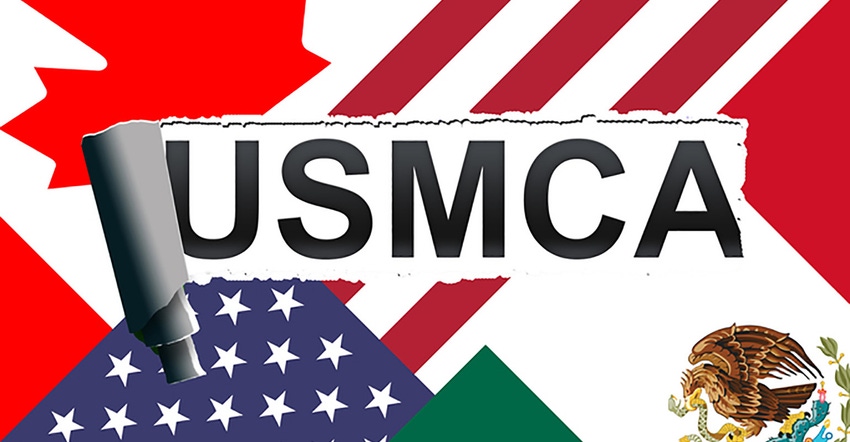USMCA passes House by large bipartisan margin, mirroring broad support
Legislative Watch: USMCA passes House; bulls-eye on CAFOs; funding averts government shutdown; real MEAT legislation introduced.

After months of intense negotiations, the House of Representatives overwhelmingly passed the U.S.-Mexico-Canada Agreement by a bipartisan vote of 385-41 (193 Democrats and 192 Republicans in support). The large vote in favor is due to the broad support of the agriculture, labor and business communities. The North American Free Trade Agreement passed in 1994 by a vote of 234-200 because of overwhelming Republican support and was opposed by organized labor.
The passage of USMCA is one of the highest priorities of U.S. agriculture. Canada and Mexico are the Nos. 1 and 2 export markets for U.S. agriculture. In 2018, the United States exported $39.7 billion in agriculture and food exports to the two countries.
U.S. Meat Export Federation President Dan Halstrom says, "Ratification of USMCA is an important step in solidifying trade relations with Mexico and Canada, which are critical destinations for U.S. pork, beef and lamb. This agreement will bolster the United States' position as a reliable supplier to two leading markets that currently account for about one-third of all U.S. red meat exports. We look forward to the Senate taking up this legislation as soon as possible and completing the ratification process."
The Senate is expected to vote on the agreement in January.
CAFOs targeted by legislation
New concentrated animal feeding operations would be banned and current CAFOs would be phased out by 2040 according to legislation, the "Farm System Reform Act of 2019," introduced by Sen. Corey Booker (D-NJ). In addition, the legislation would reinstate mandatory Country of Origin Labeling. Booker believes it is time to protect family farms against the practices of multi-national meat companies and large industrial farm operations.
Booker says, "Our independent family farmers and ranchers are continuing to be squeezed by large, multinational corporations that, because of their buying power and size, run roughshod over the marketplace. We need to fix the broken system — that means protecting family farmers and ranchers and holding corporate integrators responsible for the harm they are causing. Large factory farms are harmful to rural communities, public health and the environment, and we must immediately begin to transition to a more sustainable and humane system."
The Farm System Reform Act of 2019 would:
Place an immediate moratorium on new and expanding large CAFOs and phase out by 2040 the largest CAFOs as defined by the Environmental Protection Agency.
Hold corporate integrators responsible for pollution and other harm caused by CAFOs.
Provide a voluntary buyout for farmers who want to transition out of operating a CAFO.
Strengthen the Packers and Stockyards Act to protect family farmers and ranchers, including:
Prohibit the use of unfair tournament or ranking systems for paying contract growers.
Protect livestock and poultry farmers from retaliation.
Create market transparency and protect farmers and ranchers from predatory purchasing practices.
Restore mandatory country-of-origin labeling requirements for beef and pork and expand to dairy products.
Prohibit the USDA from labeling foreign imported meat products as "Product of USA."
The bill is not expected to go anywhere, but Booker will be discussing it during his presidential efforts in Iowa and other states.
Government funded for FY '20
Congress passed a $1.4 trillion funding package to keep the government operating through Sept. 30, thus avoiding a government shutdown. The bills also address tax issues.
A key win for the biodiesel industry was making the $1 per gallon biodiesel tax credit retroactive and extending it through 2022. The tax credit expired two years ago and a number of plants have closed during this time.
The package includes:
Border inspectors: Additional funding is provided for the Customs and Border Protection to hire 610 additional officers and agriculture specialists. This will help in efforts to protect our borders from foreign agricultural diseases entering the United States, especially African swine fever.
Disaster relief: Provides an additional $1.5 trillion in disaster assistance for producers affected by this year's disasters. Disaster relief funds that are to expire the end of the year will remain available to assist producers affected by natural disasters in 2018 and 2019.
Agency movement: The bill is silent on USDA moving the Economic Research Service and National Institute for Food and Agriculture to Kansas City. However, the bill includes language which bars USDA from moving agencies to another mission area within the department.
Broadband: An additional $555 million is provided for rural broadband.
Farm Service Agency: An additional $35 million is provided to FSA to hire farm loan officers, county office trainees and employees. This addresses the concern of staff shortages at FSA.
FSA county offices: Prohibits the closure of county FSA offices.
Real MEAT Act introduced in the Senate
Sen. Deb Fischer (R-NE) has introduced the "Real Marketing Edible Artificials Truthfully Act" in the Senate. The bill addresses deceptive labeling practices in alternative protein and requires plant-based meat alternatives to be labeled as "imitation" meat.
The bill codifies the definition of beef for labeling purposes, reinforces existing misbranding provisions to eliminate consumer confusion, and enhances enforcement measures available to the USDA if the Food and Drug Administration fails to take appropriate action.
The MEAT Act was introduced in the House of Representatives by Congressmen Roger Marshall (R-KS) and Anthony Brindisi (D-NY) earlier this year.
Source: P. Scott Shearer, who is solely responsible for the information provided, and wholly owns the information. Informa Business Media and all its subsidiaries are not responsible for any of the content contained in this information asset.
About the Author(s)
You May Also Like



